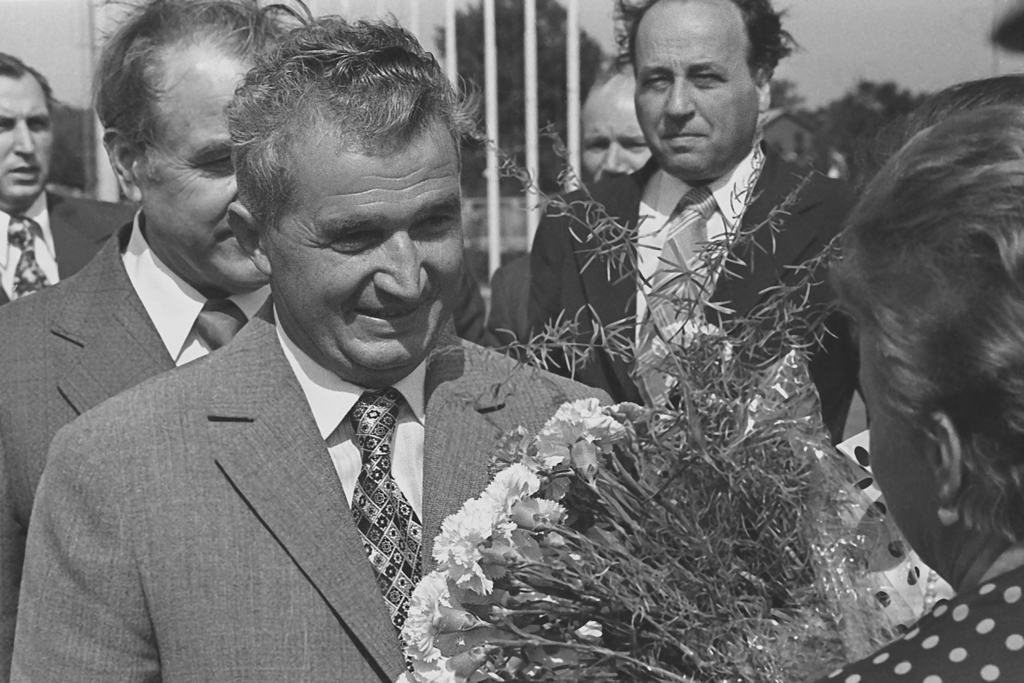
Please follow us on Gab, Minds, Telegram, Rumble, GabTV, Truth Social, Gettr, Twitter
The 26th of January marks the 105th birthday of the former Communist President of Romania. The name is familiar to many around the world, but few know about the life of the dictator, and how he achieved power.
Nicolae Ceaușescu was born on January 23rd, 1918, in the village of Scornicești, but his birthday was later officially recognized as January 26th. He was the third of ten children of Alexandrina and Andruță Ceaușescu, a family of peasants. He had the simple childhood that the countryside offers, however, his father was a well-known drunk who used to be physically and verbally aggressive. His mother was a hard-working woman. The whole family lived together in a small house with only two rooms. While going to school, young Nicolae was described as an antisocial child, with no friends, no school supplies, and often walking around in his bare feet.
After graduating four years of elementary school, Ceaușescu left for Bucharest, where he became the apprentice of a shoemaker who was also involved with the Communist Party. The young and highly impressionable apprentice quickly became a pawn in his master’s conspiracies. In 1933, he joined the Union of Communist Youth in Romania. That was the year he was first arrested during a strike, mainly because the Communist Party was illegal at that time.
He was arrested again in 1936 and sentenced to two and a half years in prison for spreading Communist propaganda through pamphlets. He was released in 1938, but that didn’t last long. In 1939, he was sentenced again to three years in prison for continuing to spread communist propaganda. He was arrested in 1940 and forced to spend his incarceration in Jilava, where Ceaușescu met his future wife, Lenuța Petrescu. She would become known as Elena Ceaușescu, and the couple would end up having three children between 1949-1951.
By the time he turned 26 years old, he had been arrested five times and had spent seven years in prison. This may be why he caught the attention of the soon-to-be Communist leader, Gheorghe Gheorghiu Dej, who took him under his protection.
After World War II, Nicolae Ceaușescu was named secretary of the Union of Communist Youth. Shortly after, in 1947, he married Elena. In 1948, after King Michael I abdicated, the Communist Party took control of the political scene. Ceaușescu was named State Subsecretary in the Ministry of Agriculture. In 1950, despite not having been in the military at all, he was appointed a Major General and awarded leadership of the State Defense Ministry.
Gheorghe Gheorghiu Dej died in 1965, and three days later, Ceaușescu took over the Communist Party as State Secretary and changed the country’s official name to The Socialist Republic of Romania. He managed to gain much power by ignoring laws, getting into conflicts, and making sure he placed his friends in positions of power.
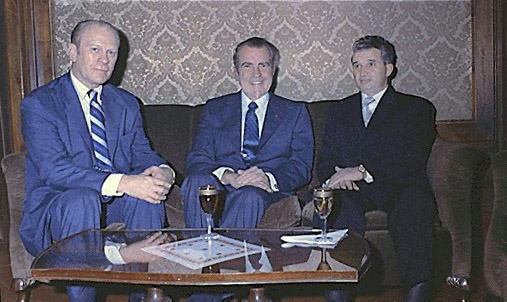
Ceaușescu gained international renown in 1968 when he bravely defied the Soviet Union and the Warsaw Pact invasion of Czechoslovakia. Romania was the only Communist-bloc country to condemn the invasion, earning Ceaușescu the reputation of a political maverick.
On the 28th of March 1974, Nicolae Ceaușescu was elected as the first president Romania ever had. The creation of the office of the President was strong political propaganda at that time. His main goal was to accelerate the process of industrialization and eliminate the Soviet threat, which made him a likable figure on the global political scene.
In 1984, he also defied a Soviet-led boycott of the Olympic Games in Los Angeles. Romania was the only Eastern-bloc nation to participate, but by this time, things in Romania had deteriorated so much that he could gain little political leverage from the move.
Obsessed with power and control, Ceaușescu controlled every source of information, blocking any opposition with the help of his Security Police, the dreaded Securitate. People started losing access to heat and hot water, having to live in temperatures barely above freezing. Power was interrupted for one hour a day at first, but starting in 1982, people had less and less power. Outages were not announced and happened at random hours of the day. In 1972 power to households and businesses was reduced by 20%, in 1982 by an extra 20%, then 50% in 1983, and an additional 50% in 1985.
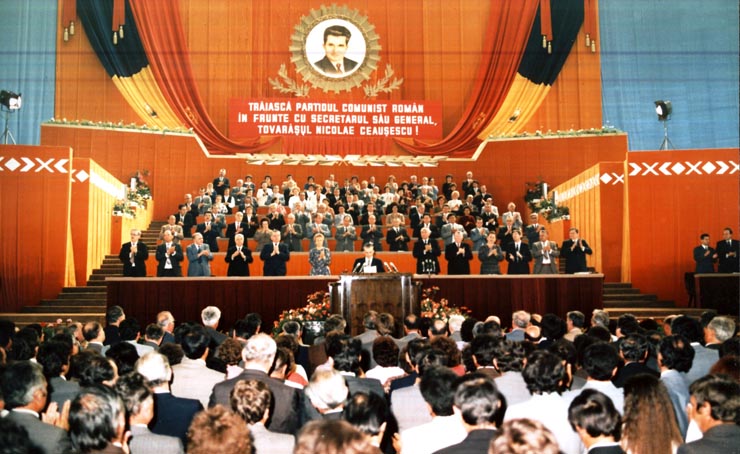
Gasoline was a luxury, and it was heavily rationed. Between 1981 and 1989, most grocery stores were not receiving adequate supplies of meat, eggs, milk, cheese, coffee, flour, or rice. The main diet of ordinary people consisted of locally sourced vegetables and fish. People were not allowed to leave the country, but many of them earned a fortune smuggling western clothes, food, and electronics into the country and selling them on the black market.
Abortions and birth control were banned, which led to an increase in the number of abandoned children. The HIV-positive population also increased dramatically. He took control of the Church and ordered many churches and monasteries to be demolished. As a strict atheist, he didn’t allow freedom of religion. Culture and history were also strictly controlled and aligned with the goals of the Party.
With his visit to North Korea in 1971, Ceașescu became fascinated with the politics of the regime. It is rumored that at that time, he became obsessed with the way the Korean leader was worshipped by the people. Once the idea took root in his mind, Ceaușescu’s Cult of Personality didn’t take long to be adopted within the country.
Mass media and every other form of information became unwilling participants in his image propaganda. It was the most severe example of a Cult of Personality since Stalin. Newspapers, books, and TV stations referred to him as “our genius leader,” “our nation’s most beloved son,” or “the warrior of peace and justice.” His wife, Elena, was also awarded undeserving degrees and her image was promoted just as much by the media.
Even though protests against the Communist Regime took place before 1989, that year marked the end of the Communist Party and Ceaușescu’s dictatorship. The bloodshed in the main cities of Romania known as the Romanian Revolution of 1989, gave courage to the nation to stand up against the oppressor.
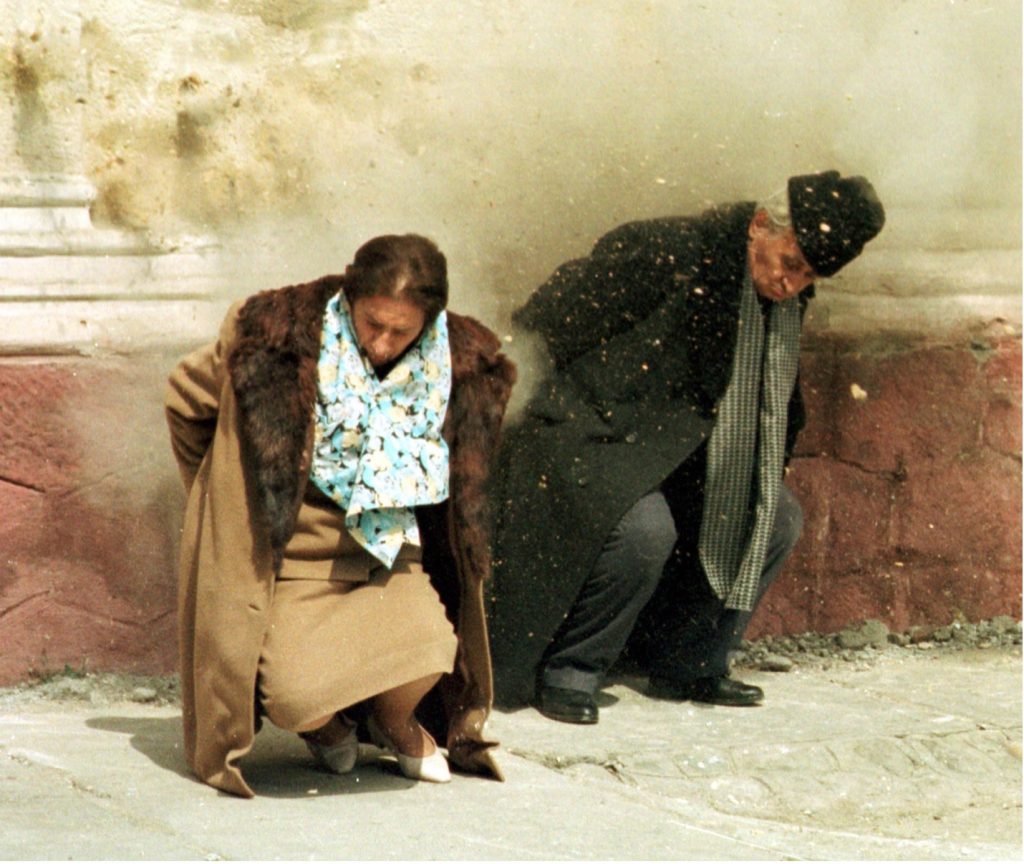
After attempting to escape with his family, Ceaușescu was caught and taken to Târgoviște, where he was tried by the ad-hoc Military Court and sentenced to death. The show trial, during which he was found guilty of genocide, was recorded and broadcast on TV worldwide. Ceaușescu and his wife never believed they were going to be executed, but they were taken outside and summarily shot numerous times. Their bodies were shown to the public without reservations. Public opinion saw it as a shameful but necessary execution. Many countries including the United States, strongly criticized how the dictator was tried and killed.
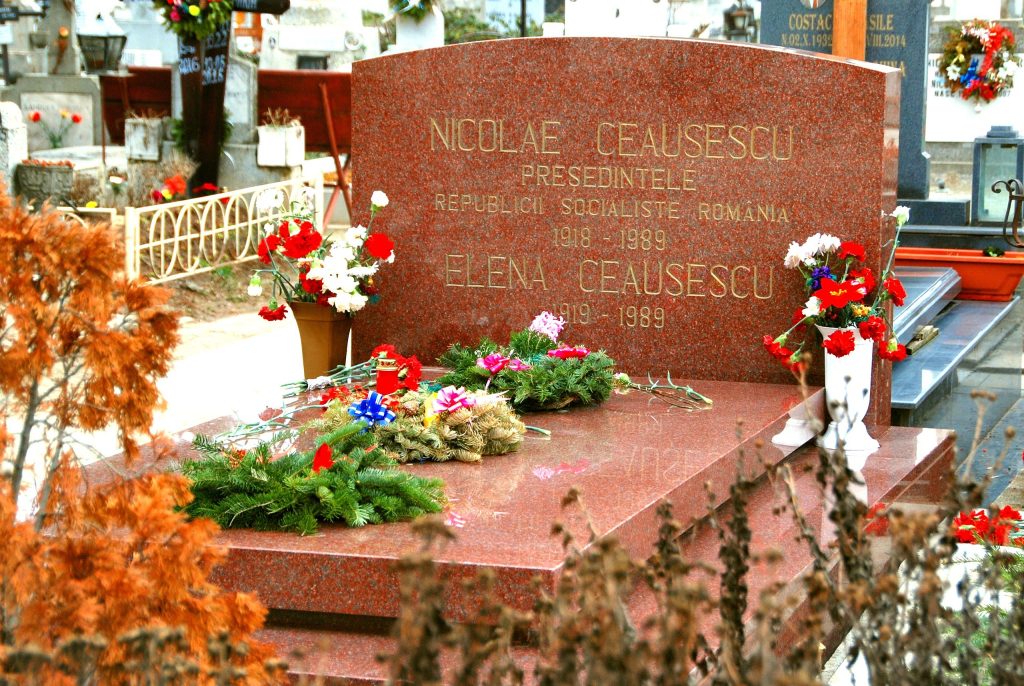
The bodies of the Ceaușescus were buried in the Ghencea Cemetery in Bucharest, but they were exhumed in 2010 to be identified and reburied.
Despite oppressing his people and being the cause of so many deaths, Ceaușescu’s grave is visited by dozens of people every year on his birthday. He left behind a complicated legacy. A part of the older generation feels nostalgia for the Golden Era, and some who had fought during the Revolution consider that it was not worth it. In any case, Ceaușescu’s regime left behind a unique mentality that is slowly disappearing with the death of the generations that lived through those times.
And thus to all tyrants!